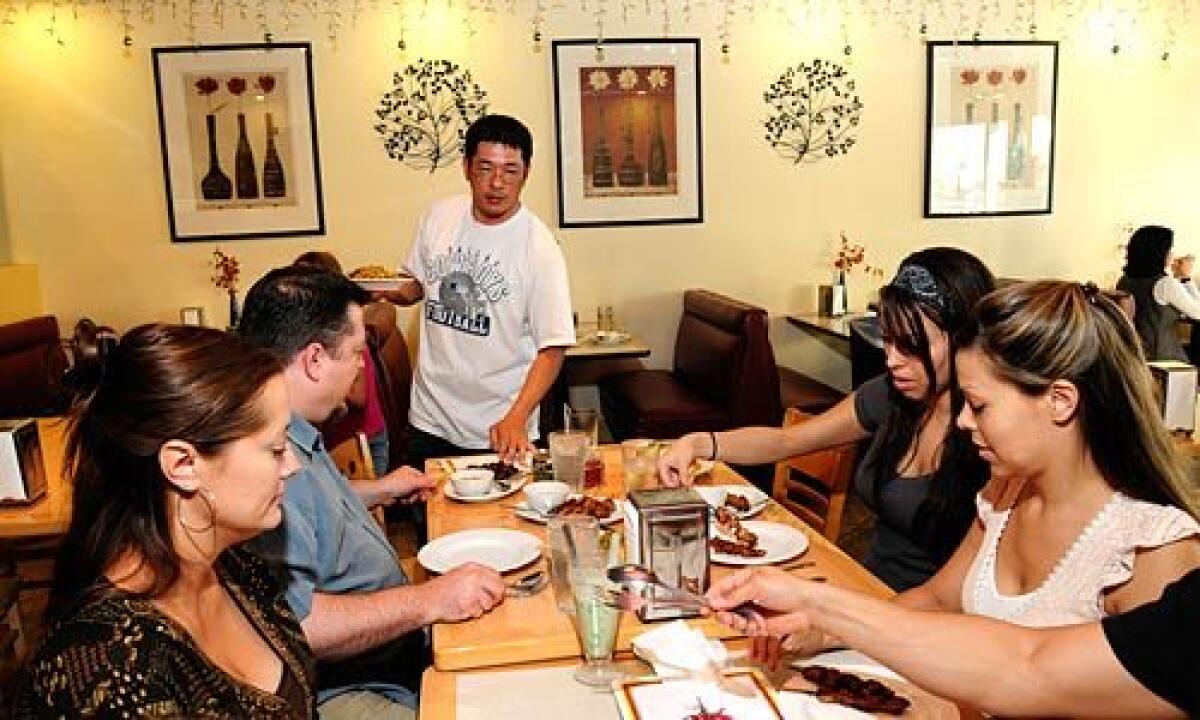An Indonesian banquet, swathed in banana leaf

- Share via
The nasi bungkus at Java Spice is a magnificent Indonesian meal, a picnic banquet swathed in fresh-cut banana leaf that looks something like a pregnant shoe box. Inside are generous chunks of coconut-infused chicken, smoldering chile-laced beef rendang, brightly spiced jackfruit curry, chunky fish cake, tofu nuggets and a blazing scarlet sambal-topped egg.
You can amplify the gentle heat with dabs of the volcano-hot fresh green sambal that’s tucked into one corner. Amazingly, the rice plateau underneath it all soaks up the luscious juices in a way that allows the flavors of each item to remain distinct.
Java Spice serves nasi bungkus only on Saturdays and Sundays when the modest cafe -- a modern storefront in a typical sun-baked Rowland Heights mall -- can seem like some sort of reunion party. People greet one another with hugs. The happy chatter of multigenerational families fills the place and the occasional curious toddler will roam the room to check out other families.
It’s not surprising that the 3-year-old restaurant holds a place of prominence among local Indonesians. Owner Gary Nanda’s wife, Mary, and her mother cooked at the well-regarded Toko Rame, a fixture in Bellflower since the 1980s. The Nandas later owned Little Java in Monterey Park until 2005.
Mary and her mother rule the kitchen at Java Spice, preparing the Indonesian-style snacks that you see stacked on the table in front of the cash register. They roast peanuts and grind them to make several styles of peanut sauces and dressings (no peanut butter for them) and the restaurant’s sambals and other condiments follow their family’s recipes.
Mary’s family hails from Java, where the spicing is relatively mild, but Gary grew up in Sumatra. There the equator slices through the middle of the island and folks perk up their appetite in the oppressive heat with an abundant use of tiny chiles. The burn level at Java Spice, Gary tells us, is a compromise.
For customers who can’t make it to the nasi bungkus fest on a weekend, the kitchen turns out about half-a-dozen combo meals.
Lontong komplit, based on dumpling-like compressed rice disks that sit in a chile-tinged coconut broth is a wonderment of contrasting textures. The disks form a little raft on which sit fork-tender beef rendang, half an egg topped with fresh red chile sambal balado and assorted vegetables under a garnish of crispy fried shallots and krupuk udang, the puffed crunchy shrimp-flavored wafers.
Fried-rice favorite
The always-popular nasi goreng -- shrimp and egg fried rice -- comes topped with two sweet soy-slicked skewers of chicken sate.
Most Indonesian food buffs know gado gado, the peanut-sauced raw vegetable salad. But there are many variations, and they’re especially wonderful here where the kitchen’s freshly ground nuts possess complex grace notes that rival those in just-roasted and ground coffee. Pecel, a spicier gado gado with subtle shrimp undertones, may also be had with lightly steamed vegetables, when it’s called lotek pecel while ketoprak, is based on cool rice vermicelli, pressed tofu cubes and bean sprouts all topped with those crispy krupuk.
Butter-sautéed frog’s legs swirled with caramelized shallots may sound like they belong at XIV or Riva, but here they are only $8.95. Likewise the splendid platter of ong choi, sautéed greens and shrimp dotted with whole quail eggs, carries the same price tag.
KFC? Hardly
The fried chicken, ayam kalasan, bears no resemblance to the Colonel’s. Its coconut water marinade sweetens the meat before half the bird is fried in one piece without batter or starchy coating. The same subtle sweetness balances the heat of udang kecap cabe, plump shrimp in brightly peppered ketjap manis, a palm sugar-sweetened soy sauce that’s a foundation of Javanese cooking.
And for dessert? I’d recommend the Indonesian-style avocado shake, es alpokat. Layered into a tall soda fountain glass with crushed ice and topped with soft glowing red palm seeds, this unimaginably delicious sweet heads a list of related es (ice) drinks -- some with sliced jackfruit, young coconut, durian fruit or grass jellies.
One guest dubbed them “food from Mars.” But truly, Toto, they’re straight from Indonesia’s street-side warung stalls and lavished with the same meticulous care as this kitchen’s best nasi bungkus.
More to Read
Eat your way across L.A.
Get our weekly Tasting Notes newsletter for reviews, news and more.
You may occasionally receive promotional content from the Los Angeles Times.









